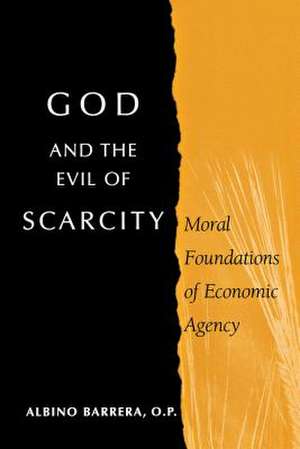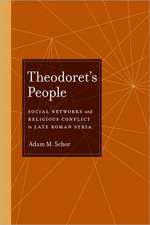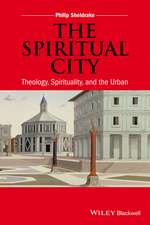God and the Evil of Scarcity – Moral Foundations of Economic Agency
Autor Albino Barrera O.p.en Limba Engleză Hardback – 14 noi 2005
| Toate formatele și edițiile | Preț | Express |
|---|---|---|
| Paperback (1) | 231.30 lei 6-8 săpt. | |
| MR – University of Notre Dame Press – 14 noi 2005 | 231.30 lei 6-8 săpt. | |
| Hardback (1) | 589.56 lei 6-8 săpt. | |
| MR – University of Notre Dame Press – 14 noi 2005 | 589.56 lei 6-8 săpt. |
Preț: 589.56 lei
Preț vechi: 765.67 lei
-23% Nou
Puncte Express: 884
Preț estimativ în valută:
112.82€ • 117.08$ • 94.30£
112.82€ • 117.08$ • 94.30£
Carte tipărită la comandă
Livrare economică 15-29 martie
Preluare comenzi: 021 569.72.76
Specificații
ISBN-13: 9780268021924
ISBN-10: 0268021929
Pagini: 306
Dimensiuni: 159 x 241 x 25 mm
Greutate: 0.53 kg
Ediția:1
Editura: MR – University of Notre Dame Press
ISBN-10: 0268021929
Pagini: 306
Dimensiuni: 159 x 241 x 25 mm
Greutate: 0.53 kg
Ediția:1
Editura: MR – University of Notre Dame Press
Recenzii
“A hallmark of Barrera's writing is that he slowly builds all the elements he uses to make his arguments. Often he proceeds so carefully that larger points are established through series of mini-treatises, many of which, due to the depth of their analysis, are worth reading in their own right.” —Review of Social Economy, vol. LXVI, no. 3, September 2008
“Albino Barrera, an economist and theologian at Providence College, skillfully and lucidly revisits scarcity with an eye toward encouraging a mindset of economic agency in place of Malthusian resignation. The book is masterfully crafted and beautifully written, and it is important reading not only for scholars of economic ethics but also for students in need of an introduction to questions of scarcity and theodicy. Barrera also has a gift for demonstrating the significance of methodology in theological ethics, which can be an inspiration to those seeking to make sense of the larger conversation and to locate their own thinking within it.” —Christian Ethics, volume 27, no.2, Fall/Winter 2007
“There are comparatively few scholars who are well versed in both theology and economics, but Barrera is clearly one of them. . . . [God and the Evil of Scarcity] is written in a clear and easy style, and has good headings, structure and index. It engages seriously with economics as well as being rich in theological insight, and can be highly commended. . . .” —Theology, Vol.109, issue 852, 11/1/06
“The overall impression one is left with is that Barrera is engaged in a much-needed project. His sophistication in both economics and theological ethics allows him to carry forward a conversation that has too often stayed at the level of vague generalities about capitalism and socialism, or well-meaning but not particularly strategic pleas on behalf of the poor.” —The Thomist, Vol. 71: 3, July, 2007
Notă biografică
Albino Barrera, O.P., is professor of humanities at Providence College, where he teaches theology and economics.
Descriere
In his celebrated Essay on Population, Thomas Malthus raised the puzzle of why a benevolent Creator would permit material scarcity in human existence. Albino Barrera revisits this question using Thomas Aquinas’s metaphysics of participation and Sacred Scripture’s invitation to covenant fidelity and kingdom discipleship as analytical lenses with which to examine the seeming incongruity of scarcity in God’s providence. Barrera concludes that scarcity turns out to be a signal opportunity for economic agency to receive, internalize, and communicate God’s goodness and righteousness within the human community.
Written for theologians, philosophers, social scientists, and policymakers interested in the theological and philosophical foundations of economics, this study argues that precarious, subsistence living is not an immutable law of nature. Rather, such a chronic, dismal condition reflects personal and collective moral failure. In this carefully researched study, Barrera argues that scarcity serves as an occasion for God to provide for us through each other and that there are strong metaphysical and scriptural warrants for enacting progressive social policies for a better sharing of the goods of the earth.
"This is a very big, very important work that takes up a large and urgent issue and follows it through with vigorous, meticulous study." —Walter Brueggemann, Columbia Theological Seminary
"Professor Barrera addresses an important theological question: 'Why would a benevolent God create a world of material scarcity with all the suffering accompanying this fact?' He goes beyond answering this question by showing that the sacrifices demanded to deal with the challenge of scarcity create virtues and situations that are deeply Christian. Barrera's well-written, jargon-free book will capture the attention of anyone interested in this topic." —Wilfried Ver Eecke, Georgetown University









